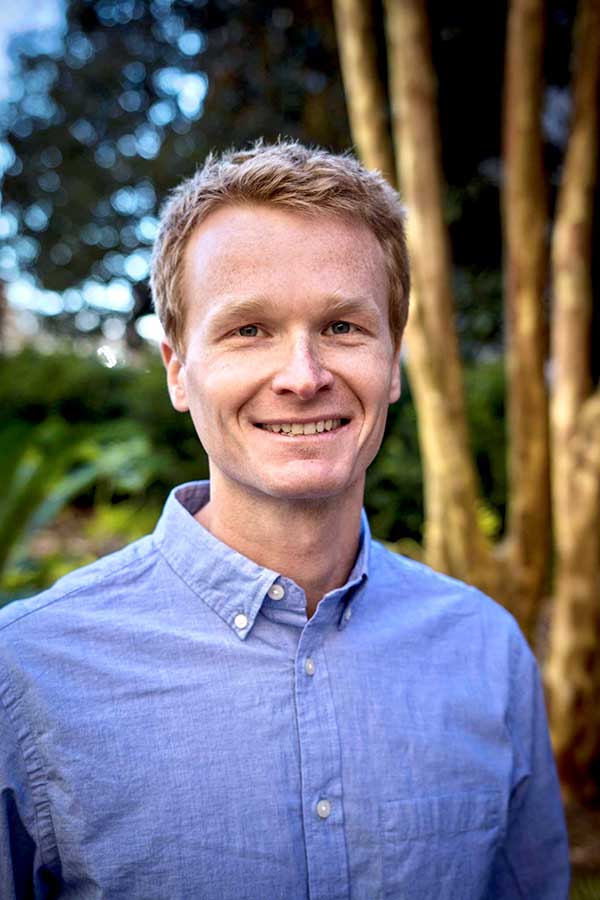Philosopher develops app to research belief-driven polarization and conflict
Meet Nick Byrd

Through the Intelligence Community Postdoctoral Fellowship (IC Postdoc Program), Nick Byrd has been studying disagreement, polarization, and cognitive biases to explore how people can improve their decision-making. An app developed by the team may one day allow businesses, teachers, and scientists to mitigate common decision-making errors. (Photo Credit: Nick Byrd)
Why do people disagree, and how can we make more reasonable judgments and decisions? Nick Byrd, who uses the pronoun they, is leading a groundbreaking effort to answer just that.
After starting undergraduate studies in engineering, Byrd became interested in larger questions about rationality, spurring a change in major to philosophy. After earning a doctorate in philosophy from Florida State University, they joined the Intelligence Community Postdoctoral Research Fellowship Program (IC Postdoc Program).
The IC Postdoc Program offers scientists and engineers from a wide variety of disciplines unique opportunities to pursue research relevant to the national security mission. For Byrd and mentor Simon Cullen, this means researching decision-making and belief-driven thinking.
When asked to evaluate arguments for polarizing policies, Byrd found that people often based their decisions solely on whether they liked the policy—what could be described as a “gut feeling” or emotional response.
“Of course, that kind of impulsive, belief-driven thinking seems to ignore the logic of the argument,” notes Byrd. “After all, we may like the conclusions of bad arguments or dislike the conclusions of good arguments. So how can we get people to be more reflective and consider not just whether they like the conclusion, but also the logic of its argument?”
Byrd and their team developed a solution that provides greater insight into disagreement and encourages self-reflection about strongly-held convictions. They found visualizing an argument helps people appreciate its logic. Additional understanding comes from the use of Socrates, an app developed by Byrd’s research team.
The app presents users with puzzles. When two users choose the opposite response, they are paired together to discuss the problem and most effective response. Some participants are prompted to write a short essay, which can aid the process of identifying the best answer, while others are offered a financial bonus for identifying the best answers. Such bonuses have not yet led to improved responses.
Importantly, Byrd and their team have found that discussing the puzzle with someone who disagrees produces better responses than simply writing about the puzzle on one’s own. See these results from the app in Figure 1.

Figure 1. Comparing the rates of rational change (i.e. correcting initial mistakes) across discussion and solo reasoning conditions. (Credit: Nick Byrd)
Byrd hopes that participation in the IC Postdoc Program and greater use of the Socrates app will ease the ability of scientists to conduct interactive studies, and support institutions in their efforts to reduce risks posed by common and avoidable reasoning errors.
“Reasoning errors can be very costly,” Byrd explained. “They can cost us time, health, money, and even our lives. So anything that can be done to make it easier to avoid these errors could have a big impact.”
“As we discover reliable, easy-to-use interventions for preventing or else overcoming reasoning errors, we can begin to publicly disseminate these general strategies and consult with organizations that want to optimize decision-making in more specialized contexts.”
Byrd encourages graduate students to consider joining the IC Postdoc Program, managed by the Oak Ridge Institute for Science and Education (ORISE). “As a reasoning researcher, I have always dreamed of learning about more high-stakes reasoning than the manufactured reasoning we tend to observe in experiments. The IC Postdoc Program has allowed me to do this. For example, I have been able to visit the Central Intelligence Agency and talk to the people who actually facilitate intelligence tradecraft in the U.S.”
You can find out more about the IC Postdoc Program at https://orise.orau.gov/icpostdoc/.
The Intelligence Community Postdoctoral Research Fellowship Program is funded by the Office of the Director of National Intelligence (ODNI) and managed by the Oak Ridge Institute for Science and Education (ORISE) under an agreement between the IC and the U.S. Department of Energy (DOE). ORISE is managed for DOE by ORAU.
ORISE Featurecast: Nick Byrd works to untangle bias in Intelligence Community Postdoctoral Fellowship
We all deliver and consume information through the lens of our own biases. Individuals can get the same information and have the same resources, but come to wildly different conclusions. Nick Byrd, a researcher in the ORISE Intelligence Community Postdoctoral Research Fellowship, uses their background studying philosophy and applied engineering to help people understand their cognitive biases and engage in reflective thinking to de-bias decision-making processes. The intent isn't to change minds or opinions, but to engage us in critical thinking. Learn more about Nick's work during this conversation with host Michael Holtz. You can learn more about the ORISE IC Postdoctoral Research Fellowship here: About ORISE | IC Postdoctoral Research Fellowship Program.

